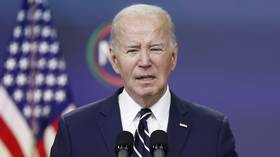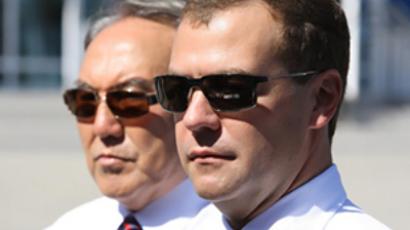Tatar leader asks for replacement
President of the Russian Republic of Tatarstan Mintimer Shaimiev won’t keep his position after his term expires on March 25. The veteran politician has asked President Medvedev for early retirement.
President of the Russian Republic of Tatarstan Mintimer Shaimiev won’t keep his position after almost two decades at the helm. During his meeting with the head of state, Shaimiev said it was time for him to make way for younger politicians, which would be in line with Medvedev’s call to modernize the country, and thanked the president for the support Shaimiev saw during his term, according to Medvedev’s press service.
Mintimer Shaimiev has often been called the survivor. He took over in Russia’s republic of Tatarstan at the dusk of the Soviet Era, in 1989. First – as Chair of the regional Cabinet of Ministers official in the Soviet Union, then – as an elected and later appointed President of the republic in Russian Federation.
More than two decades on, the republic is an absolutely different place. Being at the helm in the republic for 21 years, Shaimiev has managed seemingly an uphill task – he kept close ties with Moscow and yet has preserved the republic's national identity. He obtained enough of the attributes of an independent state to give residents of Tatarstan a feeling of full autonomy.
And this wasn’t easy in a republic with more than half of its population being Muslim Tatars. Military conflicts in the 1990’s for independence in Islamic Chechnya were sending shockwaves across other regions of Russia with Muslim population. The republic of Tatarstan was no exception. Calls for separatism were heard here as well. More than 60 percent of its residents supported the idea in the early 1990s. Experts say that should that have happened, consequences could have been drastic for Moscow. If successful and prosperous Tatarstan separated, the whole of Russia could have collapsed in a domino style. But mild and moderate policies of Shaimiev silenced the separatists, without using any force that is. Those calling for full-time independence soon realized there was no actual need for it. Shaimiev managed to earn the only special autonomy agreement with Moscow of any of the 89 regions that make up Russia. The region quickly became one of Russia’s most stable – both economically and, most importantly, ethnically. Something the current US State Secretary Hillary Clinton credited Shaimiev for during her visit to the republic’s capital Kazan in October 2009.
“You are well known as someone who has fostered religious tolerance. It's a wonderful example of what can be done if people work together. I am happy to be here in a place that models interfaith tolerance. So important in the world today" – said Mrs Clinton.
In order to ensure his republic’s national identity, Shaimiev was among the authors of Tatarstan’s first ever very own constitution in 1992. Two years later he signed a treaty with the federal government in Moscow, allowing Tatarstan to be a sovereign republic within Russia. The people of Tatarstan reacted to such moves accordingly – in two presidential elections in 1996 and 2001, Shaimiev received 90 and 79 percent of votes respectively.
Of course, there were some who criticized Shaimiev, pointing tosqueezing of critical media in the republic. But all that seemed hardly relevant when they saw construction cranes that rivaled the minarets in Kazan's skyline. While Tatarstan was being reformed politically, its residents enjoyed steady economic growth. Tatarstan holds third spot in Gross Regional Product rating in Russia, second in agricultural production and second in construction rate. Its capital – Kazan – became one of only two cities of the entire post-soviet state since the collapse of the USSR to have built its own underground train system. In 2002, Europe’s biggest petrochemical factory was built in the city of Nizhnekamsk.
The KAMAZ auto plant in the city of Naberezhnye Chelny remains one of market leaders in Russia in production of heavy duty trucks, while the KAMAZ team racers have been often winners in the famous Paris-Dakar rally. Exploration and extraction of oil in the republic has been a success – over a billion tons of crude oil have been discovered there, while Tatarstan’s oil company – Tatneft – made it into top 10 of Russia’s companies. The Soviet regime turned many of Kazan's mosques into stables and gyms. Now they have re-opened to the outmost gratitude of those going there for a prayer. And, last but not least, Tatarstan has been doing extremely well in sports – Kazan’s football club Rubin has won two consecutive Russian championships – and is now through to the knock-out stage of Europa cup; Kazan’s hockey club AK Bars is KHL winner, three-time Russian champion and champion of Europe; its basketball club Uniks also triumphed in Europe.
Many agree that hardly all of this would have been possible without Shaimiev.
After more than 20 years at power, Shaimiev is due to step down on March 25. The veteran politician himself asked President Medvedev for early retirement. Russia’s president said he valued Shaimiev’s work as the leader of one of Russia’s most successful regions. Dmitry Medvedev announced that he will suggest Rustam Minnikhanov as the new head of Tatarstan to the regional parliament. He served as finance minister of the region in the late 1990s, and later headed its government. Minnikhanov is among the three candidates named by the United Russia party to serve as the republic’s leader.
Experts have been speculating what caused one of Russia’s longest serving politicians to do such step. But Mintimer Shaimiev, who turned 73 this week, gave a simple explanation to this – he’s tired of politics and trusts his successor to continue his course.
Alexey Yaroshevsky














